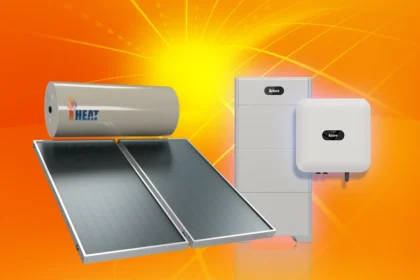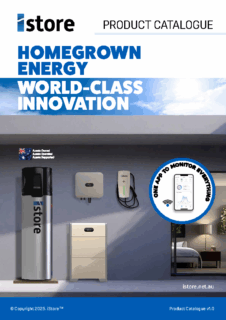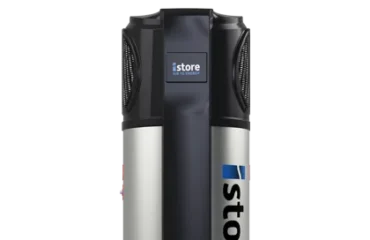
Sunshine isn’t just good for beach days and drying your washing. It’s fast becoming the future of home energy.
Across the world, more and more people are switching to solar. Rising energy costs, climate concerns, and more innovative technology are driving a shift towards cleaner, greener power.
For Aussie homeowners, especially, it just makes sense. We’ve got the sun and roof space, so why keep paying for power the old-fashioned way?
How does sun energy work, what are its benefits, and why is it a smart choice for anyone looking to live more sustainably?
What Is Sun Energy?
Sun energy (or solar energy) is the power we get from sunlight. It all starts in the sun’s core, where tiny hydrogen atoms smash together under extreme pressure and heat. This process, called nuclear fusion, creates helium and releases an enormous amount of energy in the form of light and heat.
That energy travels to Earth as electromagnetic radiation. It includes visible light (what we see), ultraviolet rays (what gives us sunburn), and infrared heat (what warms us up).
Even though the sun is 150 million kilometres away, it delivers enough energy to power everything on Earth.
We can harness sun energy in a few ways.
- Solar Electricity: Solar panels turn sunlight into usable power for your home.
- Solar Hot Water: Systems that use sunlight to heat water.
- Solar Architecture: Home and building designs that make the most of natural light and heat to reduce the need for artificial lighting or heating.
Sun Energy and the Environment
The sun gives us more energy than we could ever use and is completely free. Unlike coal or gas, we won’t run out of sunlight, making solar one of the most reliable and renewable energy sources.
Using sun energy is also much cleaner than traditional power. It doesn’t produce greenhouse gases, so you’re not adding to global warming every time you turn on the lights or run the dishwasher.
By switching to solar, we can move away from fossil fuels, which often involve digging, drilling, and transporting fuel across long distances. That process uses natural resources, pollutes the environment, and strains ecosystems.
Solar panels don’t need water to generate power, so they avoid the water waste and contamination often linked with coal or gas-fired power stations. And because panels can go on rooftops or unused land, they don’t take up space or cause land damage like other energy sources.
Solar panels produce zero emissions while running. Less pollution in the air helps improve public health in communities across the country.
Benefits of Using Sun Energy
What are the advantages of sun energy?
- Reducing High Energy Bills: Using solar energy means you can generate your own power during the day, cutting down how much electricity you need to buy from the grid and saving you money on rising energy costs.
- Increasing Energy Security: By generating solar power, especially with battery storage, you’re less affected by energy price hikes, blackouts, and changes in the energy market.
- Promoting Sustainability: Sun energy is clean and doesn’t produce harmful emissions, so switching to solar lowers your household’s environmental impact and supports a healthier planet.
- Reducing Reliance on Fossil Fuels: The more homes that use solar, the less we need to burn coal and gas, lowering air and carbon pollution and helping Australia move toward a cleaner energy future.
Applications of Sun Energy
Homes
- Solar panels generate electricity to run appliances and charge devices.
- Solar hot water systems use sunlight to heat water efficiently and cost-effectively.
- Battery storage allows households to store excess solar power for use at night or during blackouts.
- Solar-powered smart systems manage energy use more efficiently, lowering costs and boosting self-sufficiency.
Businesses
- Solar installations on warehouses and offices improve green credentials and cut costs by generating cheaper power on-site.
- Solar-powered equipment, such as lighting, security systems, and charging stations, improves energy efficiency and reduces overheads.
Communities
- Solar farms provide large-scale renewable energy to power local areas or feed into the broader grid.
- Community solar projects let residents share the benefits of solar energy without installing panels on their homes.
- Off-grid solar solutions support remote areas with limited access to traditional energy sources.
- Solar-powered public infrastructure, like streetlights, park lighting, and EV charging stations, reduces council energy costs and environmental impact.
Sun Energy Facts
Did you know…
- Australia generates more solar energy per person than any other country.
- There are over 4 million rooftop solar systems installed across the country.
- The rise in solar energy use has helped drive electricity prices down across Australia.
- The average solar-powered household saves over $1,500 a year on electricity bills.
- In 2024, solar power made up 19.6% of Australia’s electricity production in the National Electricity Market and South West Interconnected System.
- Experts predict that by 2050, solar could provide around 50% of Australia’s electricity.
With millions of solar systems already installed and thousands in savings up for grabs, there’s never been a better time to join Australia’s solar-powered future!
iStore’s Sun Energy Solutions
Solar Batteries
A solar battery stores the excess electricity your solar panels produce during the day so that you can use it later, like at night or during a blackout.
We design our solar batteries to be super safe and scalable to suit every home’s energy needs.
iStore batteries are made of lithium iron phosphate (LFP). LFP batteries are known for being safer and more stable than other lithium-ion batteries. They have four layers of built-in protection, including temperature sensors that monitor and adjust the battery’s load to prevent short circuits, overcharging, overheating, and other potential faults.
Each iStore battery is a stackable unit with a capacity of 5 kWh. Connecting two modules creates a 10 kWh battery, and connecting three modules gives you a 15 kWh battery. You can even connect two sets of 15 kWh batteries to achieve a maximum capacity of 30 kWh.
A single 5 kWh battery is ideal for smaller homes of one or two people, while a 10–15 kWh battery is perfect for average-sized homes running major appliances.
Need more backup or have a household with 4–6 people? A 30 kWh setup will give you serious energy independence!
Hybrid Inverters
A hybrid inverter maximises energy efficiency by automatically choosing the best power source—solar, battery, or grid—based on your usage patterns and solar output. This device allows you to use solar power as it’s generated, store the excess in a battery, or export it to the grid. It’s called “hybrid” because it can handle both solar and battery power in one system.
iStore hybrid inverters come in single-phase and three-phase options to suit different household sizes and energy needs.
You can connect your iStore inverter to our WLAN dongle. This small device plugs into your inverter and connects it to your home Wi-Fi, giving you full access to the iStore online monitoring platform.
With the WLAN dongle, you can
- View real-time and past solar performance data
- Understand your energy habits and make better usage choices
- Track your daily energy savings
- Monitor how much energy you’re exporting to or drawing from the grid
- Receive instant alerts if something goes wrong with your system
Heat Pumps
You can further maximise your solar energy by pairing an iStore heat pump with your solar system. Instead of using electricity from the grid, the heat pump draws power from your solar panels to heat and store water.
Our heat pumps extract heat from the air to warm the water inside the tank. By using renewable energy from both the sun and the air, iStore heat pumps significantly reduce electricity use and carbon emissions compared to traditional electric or gas water heaters.
EV Chargers
An EV charger supplies electricity to charge the battery in an electric vehicle.
With an iStore EV charger, you can power your vehicle using the free energy produced by your solar panels. It’s a sustainable and convenient way to charge at home with no fuel costs, no emissions, and no waiting around at public stations.
Why Choose iStore?
We are committed to sustainability, designing products that make the most of renewable sun energy while reducing your carbon footprint.
Our focus on quality means you get reliable, long-lasting technology. Every iStore product is backed by a strong warranty and tested for Australian conditions.
We believe sustainable energy should be accessible to everyone, so we offer affordable energy solutions that deliver upfront and long-term savings.
Steps to Transition to Sun Energy for Your Home
- Evaluate Your Home’s Energy Needs. To choose the right size system for your home, look at your electricity bills to understand how much energy you use daily, weekly, and seasonally. Also, consider your household size, appliance usage, and future needs, like adding an EV or battery.
- Choose the Right Inverter. You need a hybrid inverter that matches your system size and supports future upgrades. If your home has high energy demands or three-phase power, make sure your inverter can handle it.
- Install the Solar System. Always use a professional, accredited installer. Proper installation ensures your system is safe, compliant with Australian standards, and protected by its warranty.
- Monitor and Optimise Energy Usage. Use monitoring apps to track your solar output, battery storage, and energy habits. You can see when your solar production is highest and shift high-energy tasks like laundry, heating, or EV charging to those times to get the most out of your system.
FAQs
How Does Sun Energy Benefit the Environment?
Sun energy is clean, renewable, and produces no harmful emissions. It reduces air, water, and land pollution, cuts down greenhouse gas emissions, and helps preserve natural resources.
Is Sun Energy Cost-Effective for Homes?
Sun energy can significantly reduce electricity bills in the face of rising power costs, offer long-term savings, and increase home value.
Can I Store Sun Energy for Nighttime Use?
Yes, your solar battery can store excess energy generated during the day for later use at night.
How Much Does It Cost to Install a Solar Energy System?
Costs vary depending on system size, setup, brand, and government rebates, but a complete home solar system can range from $3,000 to $12,000.
Power Your Home with Sun Energy Today
How does the sun create energy?
By releasing an endless supply of heat and light.
This free energy beams down on your roof every day—why let it go to waste? Let iStore help you make the switch to sustainable, solar-powered living today.
Explore our range of high-quality and affordablesolar inverters, batteries, heat pumps, and EV chargers to kickstart your renewable energy journey. Then, call 1300 515 640 or fill out this online form, and we’ll help you out with expert advice and a free quote.



